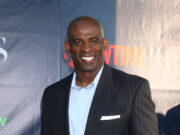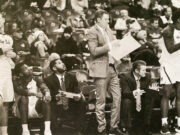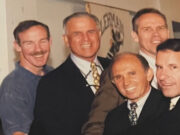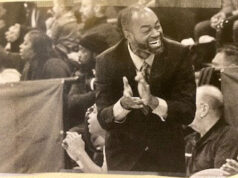With Paul Schienberg, PhD
At the end of the third round of the 2007 Bob Hope Dessert Classic in Palm Springs, Cameron Beckman and I had a chat about the mental side of his golf game. He had just finished hitting a hundred or so balls on the practice tee. Cameron was very accessible and friendly after finishing a round that was 2 under par.
I introduced myself as a reporter who wanted to ask a few questions.
Schienberg: Tell me a little about the mental side of playing golf from your point of view.
Beckman: Just to stay relaxed. If I’m not relaxed, get relaxed.
Schienberg: How do you get relaxed?
Beckman: I think I’m one of those lucky people who have an innate ability to be a relaxed person. If I’m not relaxed, I do a lot of deep breathing, get a massage, do some stretching and focusing. Hitting many golf balls before the round also relaxes me. The golf course is where I feel most at home. It is where I work, but it feels so familiar to me now, that it is home.
Schienberg: What if you are in the midst of playing your round and you find that there is a club that is not working for you that day? How do you handle it?
Beckman: I just don’t use it. I create my shots around having to use that club. As I look at a hole, I strategize how I can place my shots so I don’t have to use that club. It takes some doing. But, it really isn’t that difficult.
Schienberg: Speaking of shot strategies. Do you use visualization as a method of preparing to play a hole?
Beckman: The only times I use visualization is when I’m pitching or putting. I see before hand how the ball will bounce or roll with the terrain of the land and the grass. I see where I want the ball to land, how many bounces till it gets close to the pin, how much roll I want to create. I take some practice strokes and get the feel of the club and its speed before striking it.
Schienberg: How about before you drive or hit a long iron shot?
Beckman: When I’m up at the tee, I will remember another shot I had taken – not necessarily in the round I’m playing. Sometimes I take the memory from a completely different round or tournament. I put that image in my head as I’m taking my practice swings or looking down the fairway. It is a very positive image and it gives me confidence that I can do it here.
Schienberg: What do you do mentally after you’ve hit a bad shot?
Beckman: Golf is my career. I will play man rounds and many more shots. So, if I hit a bad shot, I know I’ve got many more to play. I don’t take each shot so seriously – like it’s my last shot ever. I put it in perspective.
Schienberg: How did you play today?
Beckman: I didn’t play well today. I just toughed it out. I played through it and tried to get my focus as well as possible under the circumstances.
Schienberg: Did you have a feeling of how the round was going to go before you went to the first tee?
Beckman: Yes, I didn’t feel like it is going to work for me today. I sort of know right away whether I feel in the groove or not. It’s just a sense I have about it. I don’t fight it. I concentrate on the other sides of my game that will go better.
Schienberg: Thanks for your time today.
Beckman: No problem. Nice meeting you.














